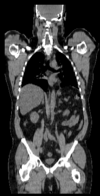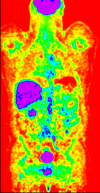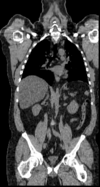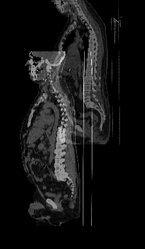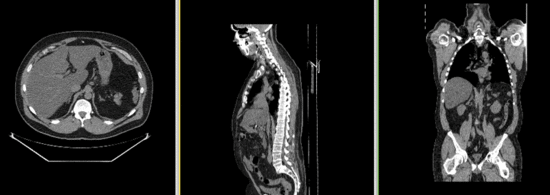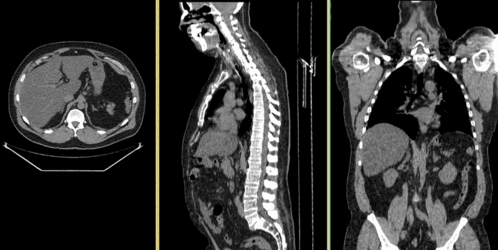Projects:RegistrationLibrary:RegLib C08
From NAMIC Wiki
Revision as of 15:25, 28 May 2010 by Meier (talk | contribs) (moved Projects:RegistrationDocumentation:RegLib 08 WholeBodyPET-CT to Projects:RegistrationLibrary:RegLib C08)
Home < Projects:RegistrationLibrary:RegLib C08
Back to ARRA main page
Back to Registration main page
Back to Registration Use-case Inventory
Contents
Slicer Registration Use Case Exampe #8: Intra-subject whole-body PET-CT
Objective / Background
Change assessment.
Keywords
PET-CT, whole-body, change assessment
Input Data
 reference/fixed : baseline CT: 0.97 x 0.97 x 3.27 mm , PET: 4.7 x 4.7 x 3.3 mm
reference/fixed : baseline CT: 0.97 x 0.97 x 3.27 mm , PET: 4.7 x 4.7 x 3.3 mm moving: CT: 0.98 x 0.98 x 5
moving: CT: 0.98 x 0.98 x 5 moving: PET: 4.1 x 4.1 x 5 mm
moving: PET: 4.1 x 4.1 x 5 mm
Registration Results
BSpline registration of full volumes achieves better alignment in the abdominal and thoracic region of interest. But the solution is suboptimal because the algorithm is distracted by the strong differences in head position.Rather than trying to address this with more DOF, we calculate a BSpline transform based on croped images including only the main region of interest.
Download
- download full tutorial set (Data+intermediate results+presets+tutorial, zip file ?? MB)
- download example data set (Data only, zip file 135 MB)
- download step-by-step tutorial (PowerPoint 2 MB)
- download registration parameter presets only (zip file with MRML scene files ?? kB)
- download registration BSpline testset only (zip file .nrrrd files 67 MB)
Link to User Guide: How to Load/Save Registration Parameter Presets
Discussion: Registration Challenges
- accuracy is the critical criterion here. We need the registration error (residual misalignment) to be smaller than the change we want to measure/detect. Agreement on what constitutes good alignment can therefore vary greatly.
- the two series have different voxel sizes
- because of the large FOV we have strong non-rigid deformations from differences in patient/limb positions etc.
- images are large volumes (>100 MB total)
- image content reaches border of image on two sides
- 2 images pairs have to be aligned, i.e. the calculated transform must be applied to the second (PET) image.
Discussion: Key Strategies
- to calculate the transform, we use the images with the most accurate geometric representation and the smallest expected change, i.e. we align the follow-up CT to the baseline CT and then apply the transforms to the PET image.
- because of the non-rigid differences due to posture and breathing we will need to apply a 2-step registration with an affine alignment followed by a BSpline.
- the strong differences in head position is likely to distract the registration and lead to suboptimal results. Hence we produce a cropped version of the two CT images to calculate the BSpline transform.
- the two images are far apart initially, we will need some form of initialization. We will try an automated alignment first. If this fails, we do a 2-step process with manual initial alignment, followed by automated affine.
- because accuracy is more important than speed here, we increase the iterations and sampling rates. Note however the large image size, which makes comparable sampling % still large compared to other datasets.
- the two images have identical contrast, hence we could consider "sharper" cost functions, such as NormCorr or MeanSqrd. However, since these are not (yet) available for the BSpline registration.
